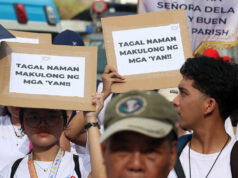Final ASEAN chairman’s 31st summit statement now even softer on China
THE FINAL version of the Association of Southeast Asian Nations (ASEAN) chairman’s statement at the end of the bloc’s 31st summit — released to media more than a day after heads of state ended their meeting — turned out even softer on China than the diluted final document of the 30th leaders’ meeting last April.

Both statements were issued under the Philippines’ chairmanship of ASEAN this year.
A copy of the statement, released yesterday, was markedly softer than the one issued at the end of the 30th summit in that it did not even mention differences among leaders on the bloc’s approach to China’s assertive behavior in the South China Sea.
The draft in April had cited “land reclamation and militarization that may further complicate the situation…” in a reference to China’s building spree and installation of weapons systems in the disputed area. That mention was deleted in the final statement of the 30th summit which nevertheless “took note of concerns expressed by some leaders over recent developments in the area.”
Presidential Spokesperson Harry L. Roque, Jr. had said in a press briefing on Monday that “at least two to three” ASEAN leaders again raised the matter despite President Rodrigo R. Duterte’s attempt to keep the dispute off talks.
The chairman’s statement on the 31st summit that ended last Tuesday carried a section on the South China Sea that “took note of the improving relations between ASEAN and China” and encouraged the “conclusion of a substantive and effective” code of conduct for the South China Sea (CoC).
CoC talks are scheduled to start early next year after ASEAN and China adopted the framework for negotiations last August, about 15 years since both parties signed a vaguely worded Declaration on the Conduct of Parties in the South China Sea (DoC) on Nov. 4, 2002.
Analysts have since cautioned that much remains to be seen in any time table that may result from next year’s talks and whether anything can even be enforced, especially since China has persisted in reclaiming land and building structures despite agreements among claimants to keep the status quo in the disputed area.
A landmark ruling by an arbitration court in the Hague last year said Beijing’s basis for its claim to much of the South China Sea — the so-called nine-dash line — did not have legal weight. But Mr. Roque told reporters yesterday that the ruling did not have any bearing on next year’s CoC talks since it concerned only the Philippines and China.
“We reaffirmed our commitment to the full and effective implementation of the DoC in its entirety, and the importance of undertaking confidence building and preventive measures to enhance… trust and confidence among parties,” read the ASEAN chairman’s statement on the 31st summit, noting “the successful testing” of a hotline among foreign ministries of claimant countries “to manage maritime emergencies in the South China Sea”.
It also said parties are now working to put into operation the Joint Statement on the Observance of the Code for Unplanned Encounters at Sea in the South China Sea.
“In our view, these are practical measures that could reduce tensions and the risks of accidents, misunderstandings and miscalculation,” the statement read.
“We likewise reaffirmed the importance of maintaining and promoting peace, security, stability, maritime safety and security, rules-based order and freedom of navigation in and overflight above the South China Sea.”
The 31st summit statement also remained silent on the plight of Myanmar’s Rohingya minority which United Nations officials have described as being tantamount to ethnic cleansing. Non-interference in members’ internal affairs has long been a key ASEAN principle.
At the same time, ASEAN “expressed grave concern over the recent provocative and threatening actions, including the nuclear test, by the Democratic People’s Republic of Korea on 3 September 2017 and its ballistic missile tests over the past year…” — R.A. Zamora



